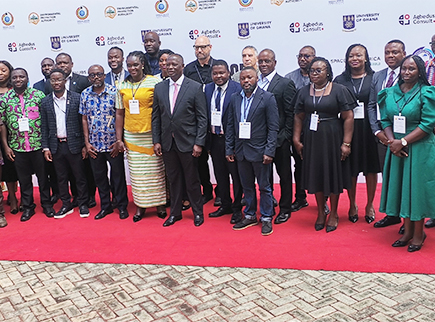Ghana’s Cabinet has approved three landmark policies as the country seeks to develop space technology and innovation to an appreciable standard.
The instruments encompass the establishment of a National Space Policy, Ghana Space Agency and Science, Technology and Innovation Policy, which would serve as the guiding framework that sets out the country’s ambition to position itself strategically in the global space economy.
Mr Emmanuel Armah-Kofi Buah, the acting Minister of Environment, Science, Technology and Innovation, made this known in an address at the maiden Ghana Space Conference, in Accra.
Space technology, he said, offered the country enormous potential to address some pressing development challenges, creating value for multiple industries.
“The future of development is written in the skies. Satellites are no longer a luxury; they are the backbone of modern economies,” Mr Kofi-Buah said.
“They power precision farming, enhance disaster early warning systems, support the protection of forests and water bodies, and strengthen our digital economy.”
The World Economic Forum (WEF) estimates that the global space economy will be worth some US$1.8 trillion by 2035, up from US$630 billion in 2023.
The growth drivers for the space economy include greater connectivity via satellites, higher demand for positioning and navigation services on mobile phones, and increased demand for insights powered by AI and machine learning.
Those innovations were delivering greater benefits to a more diverse set of stakeholders than ever before, including companies in industries ranging from food and beverage to transportation, according to development trend analysts.
On the Ghana Space Agency, Mr Buah, also the substantive Minister of Lands and Natural Resources, explained that the Attorney-General’s Department had been directed to commence the legal processes that would give effect towards its establishment.
“Once launched, it will serve as the institutional backbone of our space programme, coordinating national efforts, mobilising resources, and ensuring that space applications bring direct benefits to the people,” he noted.
Additionally, budgetary support would be provided to strengthen the Ghana Space Science and Technology Institute, and to operationalise the Ghana Space Agency.
Professor Nana Ama Browne Klutse, the Chief Executive Officer, Environmental Protection Authority (EPA), underscored the need for Ghana to invest massively in space science technology.
She cited space-based environmental monitoring technology, which when developed to an appreciable standard, could provide the authorities with a bird’s eye view of the Earth, allowing them to gather data on everything; from atmospheric conditions to changes in the oceans and land cover.
Dr Joseph Tandoh, the Director, Ghana Space Science and Technology Institute (GSSTI), described the country’s maiden conference as timely as it would facilitate dialogues on national space law and governance.
The two-day programme was on the theme: “Harnessing Space Technology for Sustainable Development and Inclusive Growth in Ghana and Beyond”.
It was organised under the auspices of the EPA, GSSTI, Ghana Meteorological Agency, All Nations University, Spacehubs Africa, and Agbedus Consult.

